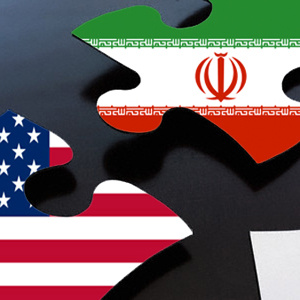Is There A Solution to Iran-U.S. Challenges?

If there is one achievement the Americans have made regarding Iran’s nuclear program, it is turning the issue into an international concern. The latest resolution issued by UNSC against Iran’s nuclear program, namely Resolution 1929, is mainly drawn from Chapter 7 of the UN Charter (read here) which indirectly paves the way for military intervention of the international community. Saddam Hussein’ Iraq received a good deal of resolutions against it based on this chapter.
Iran is no Iraq however, and a U.S. mired in Iraq and Afghanistan should go through a long process of thought before deciding to attack Iran. But whatever it takes to deter it, the specter of a nuclear Iran is unbearable for Washington. It would simply upset the status quo in the Middle East, and spark an arms race in the region.
On the other side of the equation is the Iranian government. Has the West finally understood that Ahmadinejad’s rabble-rousing rhetoric is mainly targeted to a domestic audience? The Iranian government is meanwhile notorious for making decisions on the backstage of the political landscape, where public opinion can in no way infiltrate. The byzantine decision-making structure of Iran’s political system nonetheless thwarts the administration’s efforts to make independent diplomatic decisions, a trend that will undermine Iran’s diplomatic apparatus in the long run.
In the most likely scenario, Iran and the West will continue their negotiations, and the efficiency of such talks will remain a matter of doubt. It seems that even public opinion in Iran is not well aware of the contentious issues between Tehran and Washington. It would well serve both the nation and the state if President Ahmadinejad appeared on a nightly news talk show and talked to the people about our challenges with the West –pointblank. Are all Iranians, for example, informed that our nuclear program is not our only problem with the U.S. and its allies?
Iran’s current nuclear path is not one that can lead to success. The government should extend its hand to the international community and show further transparency in its political machinery. The muscle flexing or sequestering the nation will not serve any good. The only way to untangle our complicated relations with the West is the initiation of constructive talks over our real problems. Human rights issues, the Middle East peace process, Iran’s support for Hamas and Hezbollah and its role in Iraq, Afghanistan and Lebanon have created consternation in the West. The nuclear program –a priority for both Iran and the West- has been manipulated by the U.S. into depicting an evil face for Iran in the eyes of the international community, a picture more deserving for an iron-fisted dictatorship such as North Korea. It is, in the end, up to our president to decide which path—openness and dialog or belligerence and confrontation—to pursue in dealing with the outside world.

